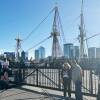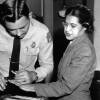This month marks 15 years since the US invaded Iraq. The country has declared victory over ISIS and hasn't seen a terrorist attack since the beginning of the year. With elections set for May, it appears Iraq is on a peaceful streak.
Some Iraqis, such as businessman and economist Hassan Hadad, say their country is starting to turn a corner. Hadad spent much of his life in Canada but returned to Iraq in 2013 to start anew.
A few days ago, he found himself at a new Baghdad startup called The Station. It's a shared incubator and coworking space where techies and artists come together.
"It was the first time that I've gone to such an event in Baghdad. It was just beautiful," Hadad says. "I think it's the first [startup incubator] in all of Iraq, to be honest with you. It's a great initiative that was established by a bunch of twentysomethings. You know, they're basically getting loans [of money] to make this happen, and they put it together. It looks very modern."
In most cities, startups and new businesses signify stability, and Hadad says he's hopeful the country will continue to improve economically.
"The fact of the matter is, it's first time in 7,000 years of history Iraq has a democracy. We either take it and run with it, or we waste the opportunity," he says. "ISIS has been defeated militarily. The economy is rebounding. There's people who are going into the private sector and doing great things. There is hope. And it is tangible."
Journalist Vivienne Walt spent two years in Iraq after the 2003 US invasion, but she hadn't been to Baghdad for a decade until she returned last month for Time magazine. She found the city had changed in some startling ways.
"The streets were absolutely packed with young Iraqis because it was the first night of the spring break, and families were piling into restaurants,” she says.
Walt's optimism, though, was tempered.
“This is a country that, on paper anyway, has great prospects," she says. "It has massive oil reserves, the largest in the world. And it has every reason to be optimistic about its economic future. The real problem is that there has been so much dysfunction over so many years and a very entrenched system of corruption.”
Walt also marvelled at the number of optimisitc young people looking to create a new Baghdad. According to UN statistics, about 40 percent of Iraq's population was born after the US invasion.
“So I met a lot of people who were in their early 20s, just starting their careers. And they say they had a vague memory of bombs falling, and they never really understood what was going on," she says. "They just remembered that they had been sort of fleeing Baghdad for some granny's house up in the country."
"And then there are a whole lot of other Iraqis who really are post-Saddam kids,” she continues, referring to Iraq's iron-fisted leader of 30 years, Saddam Hussein, who was toppled by a US-led coalition in 2003. “They really don't have any sense of having been liberated from some awful dictatorship. That is ancient history to them.”
From PRI's The World ©2017 PRI




